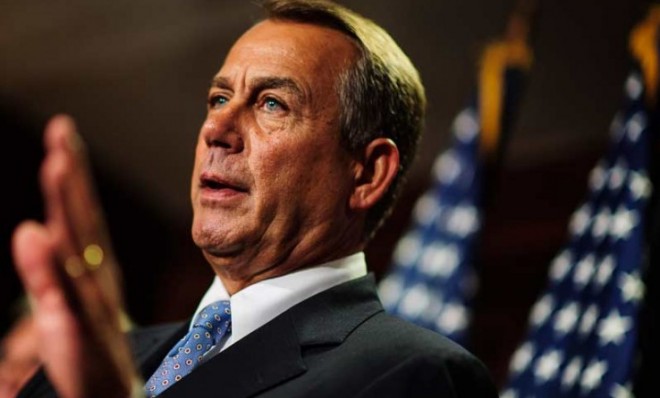Are half of House Republicans really willing to let the U.S. default?
Economic suicide is a real option for scores of lawmakers, says Politico


Unless Congress acts, the U.S. will run out of money to pay its bills in late February or March — at which point, economic chaos would (at least theoretically) break loose. And yet, more than half of Republicans in the House are willing to allow such a catastrophe as a way of forcing President Obama to agree to steep spending cuts, according to Politico:
Republican leadership officials, in a series of private meetings and conversations this past week, warned that the White House, much less the broader public, doesn't understand how hard it will be to talk restive conservatives off the fiscal ledge. To the vast majority of House Republicans, it is far riskier long term to pile up new debt than it is to test the market and economic reaction of default or closing down the government…
[House Speaker John] Boehner's own staff has warned conservative lawmakers that deficits will soar, as interest rates rise, the markets will tumble and the economy will face catastrophe if they truly follow through on default. They will walk members through a presentation on this scenario this week, and the hope is conservatives will conclude it would be economic and political suicide to go all in. But GOP leaders have made similar pitches before, and most House Republicans didn't buy it. They are willing to take that risk because they believe the future consequences of more spending are more severe. [Politico]
These lawmakers appear to be severely underestimating the fallout from a default. The U.S.'s budget deficit — mainly driven by entitlement programs, and exacerbated in recent years by the Great Recession, the Bush tax cuts, and the wars in Iraq and Afghanistan — is indeed too big, but the deficit's short-term impact on the economy has so far been negligible, and pales in comparison to what would happen under default. Matthew O'Brien at The Atlantic explains:
[A] world without a debt limit increase is a world where the government has to stop paying 40 percent of its bills overnight. Everything from food stamps to defense spending to maybe even Social Security benefits would go unpaid. Now, Congress would presumably relent after a few weeks of this, but if it didn't, the economic damage would be mind-blowing. Here's the depressing math. The government spends about $3.6 trillion a year, which means going past the debt ceiling will suck about $1.4 trillion out of the economy over a year. Yet it gets worse. With the Fed already doing about as much as it will, the multiplier on government spending is almost certainty quite high — say 1.5 — so that $1.4 trillion less is more like $2.16 trillion less. To put that in perspective, that's -14.4 percent GDP growth on an annualized basis. Yes, that's a negative sign there. And this probably understates things, since we haven't even tried to account for the negative wealth effect from the inevitable market meltdown. [The Atlantic]
House Republicans are demanding a "dollar-for-dollar decrease in spending in the time period covered by the debt increase," reports Politico. That means a $1 trillion increase in the ceiling would, in an ideal House GOP world, result in $1 trillion in spending cuts — right now. Even some conservative writers are baffled by this suggestion. As Conn Carroll at The Washington Examiner writes:
The Week
Escape your echo chamber. Get the facts behind the news, plus analysis from multiple perspectives.

Sign up for The Week's Free Newsletters
From our morning news briefing to a weekly Good News Newsletter, get the best of The Week delivered directly to your inbox.
From our morning news briefing to a weekly Good News Newsletter, get the best of The Week delivered directly to your inbox.
[C]utting government spending by 44 percent right now would cause severe economic pain — pain for which the country would rightly blame Republicans…
[T]here is only so much spending that can be cut right now. House Republicans need to come up with a more realistic price for raising the debt limit, otherwise they are setting themselves up for certain failure. [The Washington Examiner]
If the House GOP really is as adamant as Politico reports, the Obama administration's best hope may be to negotiate a deal with Republicans in the Senate, and shame the House into allowing the bill to come to the floor. Or perhaps the White House may want to reconsider its decision to take the $1 trillion coin off the table.
A free daily email with the biggest news stories of the day – and the best features from TheWeek.com
Ryu Spaeth is deputy editor at TheWeek.com. Follow him on Twitter.
-
 Employees are moving out rather than up with career minimalism
Employees are moving out rather than up with career minimalismThe explainer From career ladder to lily pad
-
 ‘It is their greed and the pollution from their products that hurt consumers’
‘It is their greed and the pollution from their products that hurt consumers’Instant Opinion Opinion, comment and editorials of the day
-
 Jane Austen lives on at these timeless hotels
Jane Austen lives on at these timeless hotelsThe Week Recommends Here’s where to celebrate the writing legend’s 250th birthday
-
 Has Zohran Mamdani shown the Democrats how to win again?
Has Zohran Mamdani shown the Democrats how to win again?Today’s Big Question New York City mayoral election touted as victory for left-wing populists but moderate centrist wins elsewhere present more complex path for Democratic Party
-
 Millions turn out for anti-Trump ‘No Kings’ rallies
Millions turn out for anti-Trump ‘No Kings’ ralliesSpeed Read An estimated 7 million people participated, 2 million more than at the first ‘No Kings’ protest in June
-
 Ghislaine Maxwell: angling for a Trump pardon
Ghislaine Maxwell: angling for a Trump pardonTalking Point Convicted sex trafficker's testimony could shed new light on president's links to Jeffrey Epstein
-
 The last words and final moments of 40 presidents
The last words and final moments of 40 presidentsThe Explainer Some are eloquent quotes worthy of the holders of the highest office in the nation, and others... aren't
-
 The JFK files: the truth at last?
The JFK files: the truth at last?In The Spotlight More than 64,000 previously classified documents relating the 1963 assassination of John F. Kennedy have been released by the Trump administration
-
 'Seriously, not literally': how should the world take Donald Trump?
'Seriously, not literally': how should the world take Donald Trump?Today's big question White House rhetoric and reality look likely to become increasingly blurred
-
 Will Trump's 'madman' strategy pay off?
Will Trump's 'madman' strategy pay off?Today's Big Question Incoming US president likes to seem unpredictable but, this time round, world leaders could be wise to his playbook
-
 Democrats vs. Republicans: who are US billionaires backing?
Democrats vs. Republicans: who are US billionaires backing?The Explainer Younger tech titans join 'boys' club throwing money and support' behind President Trump, while older plutocrats quietly rebuke new administration